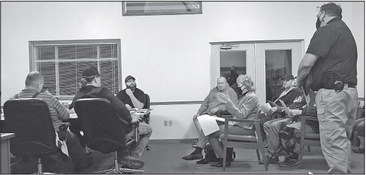Dorchester agrees to $4K/month for deputy


By Kevin O’Brien
Dorchester’s village board voted last week to spend up to $4,000 a month for police protection from the Clark County Sheriff s Department, which has offered to assign a deputy to the village for an average of 30 hours per week.
Sheriff Scott Haines attended the board’s Oct. 7 meeting to discuss a proposed contract, and village attorney Bonnie Wachsmuth was also there to raise questions and clarify certain provisions.
“We both agree this was just a draft,” Haines said, referring to a five-page agreement drafted by the county’s attorney, Jacob Brunette.
The village has been without a local police force since the end of July when longtime police chief Gary Leichtman retired and part-time officer Consuela Maldanado also quit. Village officials have started the process to hire a new officer, but in the meantime, they want a sheriffs deputy to patrol the village.
As proposed in the contract, the sheriff s department would commit a deputy to work an average of 30 hours per week, including nights and weekends.
“During the regular work period, the deputy will provide continuous law enforcement patrol within the village,” the agreement states. “When on duty, the deputy will be the first responder to all dispatched events in the village.”
See DORCHESTER/ Page 6 The 30 hours would not include the time it takes to attend monthly village board meetings or to appear in court when required to. The deputy will enforce the village’s ordinances and provide the board with a monthly report detailing the number of citations issues, arrests made and calls for service.
Although the sheriff will maintain supervisory control over the assigned deputy, the department says it will work with a designated village liaison to go over patrol priorities and special assignments.
Wachsmuth urged the board to set a dollar amount for those services, since the cost of 30 hours could vary greatly depending on whether it is a regular or reserve deputy assigned to the village and whether that person is working overtime hours or not.
Sheriff Haines agreed with Wachsmuth, noting that his office may scale back its patrol schedule if the cost is getting close to the set dollar amount.
“I think that would be best for your budget purposes,” he told the board.
Based on wage rates provided to the village, trustee Clem Klimpke said a regular deputy would cost $28.53 per hour, and a reserve deputy would be $22.64. Overtime hours would be 1.5 times more.
Trustee Keith Lageman said the village should be able to reallocate the money it was paying Leichtman toward a deputy. At $25 per hour for 40 hours, that equalled roughly $4,000 per month.
To ensure the best use of the village’s money, Wachsmuth suggested eliminating a provision in the agreement that commits the deputy to meeting with any village resident upon request.
“With the time you’re paying them, you don’t want them to just be meeting with residents every time a resident requests,” she said. “That needs to be taken out of there.”
The term of the agreement is currently set at one year, with an automatic renewal after that, but it also includes a provision for early termination. Village officials said they would prefer to see it as more of a month-to-month contract.
Wachsmuth also noted that the agreement includes provisions that protect the county from lawsuits, but none for the village, so those need to be added.
“We don’t want their deputy suing us anymore than us suing them for things that happen,” she said.
The village will also needs to talk to its insurance company about some of the insurance requirements included in the contract, Wachsmuth said.
Sheriff Haines said this is the first time his office has contracted with a municipality like this, so he expects there to be some fine-tuning before it is adopted. Board members agreed to revisit the contract in November once Wachsmuth and the county attorney work on some of the provisions.
In the meantime, Lageman said he was happy to have seen a sheriff’s deputy in the village twice that week as part of their regular patrol duties.
“It was good to see they were coming through town,” he said.
Sheriff Haines said his deputies are doing the best they can to help out the village during this interim period.
“It’s a big county,” he said. “It’s a lot of area to cover.”
Payroll issues addressed
Wachsmuth talked to the board about possible legal issues created by the village paying the wages of park and cemetery workers. Because these people receive W-2s from the village, she said obligations like worksmen’s comp and unemployment fall on the village, not on the park or cemetery.
“You guys are opening up a whole can of worms by treating people as employees who are truly not your employees,” she told board members.
Wachsmuth said the village can either take full responsibility for the park and cemetery employees — which could mean extra costs and supervisory responsibilities — or have those entities take responsibility for their workers. Either way, she said money could be exchanged in the form of donations to help cover the payroll costs.
Jim Maurina, president of the cemetery board, said they’ve never run into any problems with the cemetery workers in the nearly 60 years he has been on the board. He said the cemetery board’s secretary does not want to take on payroll duties, so he thinks it would probably be better for the village to handle it.
“The cemetery can make a donation at the end of the year to compensate for what the village has done, whatever it comes to,” he said.
Village officials had previously discussed the issue with the park board, but no one from the park corporation was at last Wednesday’s meeting.
Ultimately, the trustees voted to have a representative from the village board approach both the park corporation and cemetery board and ask them for a cost estimate on handling payroll expenses.
Trustee Julie Goldschmidt originally made a motion to have the village stop providing payroll services to the park board as of Dec. 31, and to provide a donation instead, but that motion failed.
Other business
_ Connie Decker updated the board on a project to spruce up the corner of Front Street and Business CTH A, primarily using a $2,500 grant from the Dorchester Community Foundation. Other community groups have donated benches, flowers and flagpole for the corner, she noted.
_ The board voted to hire CLA (Clifton-LarsonAllen) of Marshfield to finish the village’s current audit for $7,000 and to pay the firm $14,000 for next year’s audit. The action was needed after accountant Larry Soyk of Abbotsford decided to do no longer do the village’s annual audit.
_ The board voted to remove a residency requirement for the village police chief after Wachsmuth pointed out that it conflicts with state law.
_ The board set 4 to 7 p.m. as local trick-or-treat hours on Saturday, Oct. 31.
_ The board directed DPW Clint Penney to get a cost estimate for re-keying all of the doors at village facilities. Penney said a lot of old keys are floating around, and there’s no way of knowing who currently has one. Trustees said once new keys are issued, they would like to keep a list of those who have one.
_ The board approved a new rental agreement for the village hall, which includes $50 rent for three hours plus a $50 deposit that will be refunded once the hall is cleaned.
_ The board authorized Jenny Halopka, the lessee of Memorial Hall, to handle all rental inquires, communications, agreements and payment collections for the facility. Trustee Eric Klemetson voted no after questioning whether Halopka should have the final say on who rents the hall.
_ The board voted to discontinue the village’s subscription to Lexipol, a company that provides policies and training for police departments. It was noted that former chief Gary Leichtman was the only with access to the system, which cost the village $1,000 per year.
_ The board voted not to offer Wisconsin Retirement System benefits to village employees, citing concerns with a cost to the village of up to $22,000. The board’s personnel committee had recommended against offering WRS because it would have to be offered to all village employees at a substantial cost.
The village’s police committee, on the other hand, had recommended offering the benefit in order to help in recruiting a new police officer. Trustee Lageman, however, said the money saved on not offering WRS benefits could be put toward a higher wage for the new officer and other village employees.
Trustee Klimpke said the board can always revisit the issue if the village struggles to recruit a new officer.
_ The board approved a 2021 budget request, with zero increase, from the Dorchester Public Library. A motion to approve the Central Fire and EMS budget for 2021 was tabled because the village’s portion was not available for review at the meeting.
_ The board voted to once again seek bids for razing three dilapidated structures at 128 S. Second St., with the costs being billed to owner Terry Recore. No one submitted a bid when the village previously advertised for someone to tear down the structures Recore told the board that he was trying to work on the property, but circumstances were getting in his way. He also claimed he was being overcharged for water and sewer services at the house.
_ The board authorized Wachsmuth to work on updating the village’s employee handbook so it complies with current labor laws. Before doing so, she agreed to speak with a human resources attorney previously contacted by clerk Michelle Dunn.


